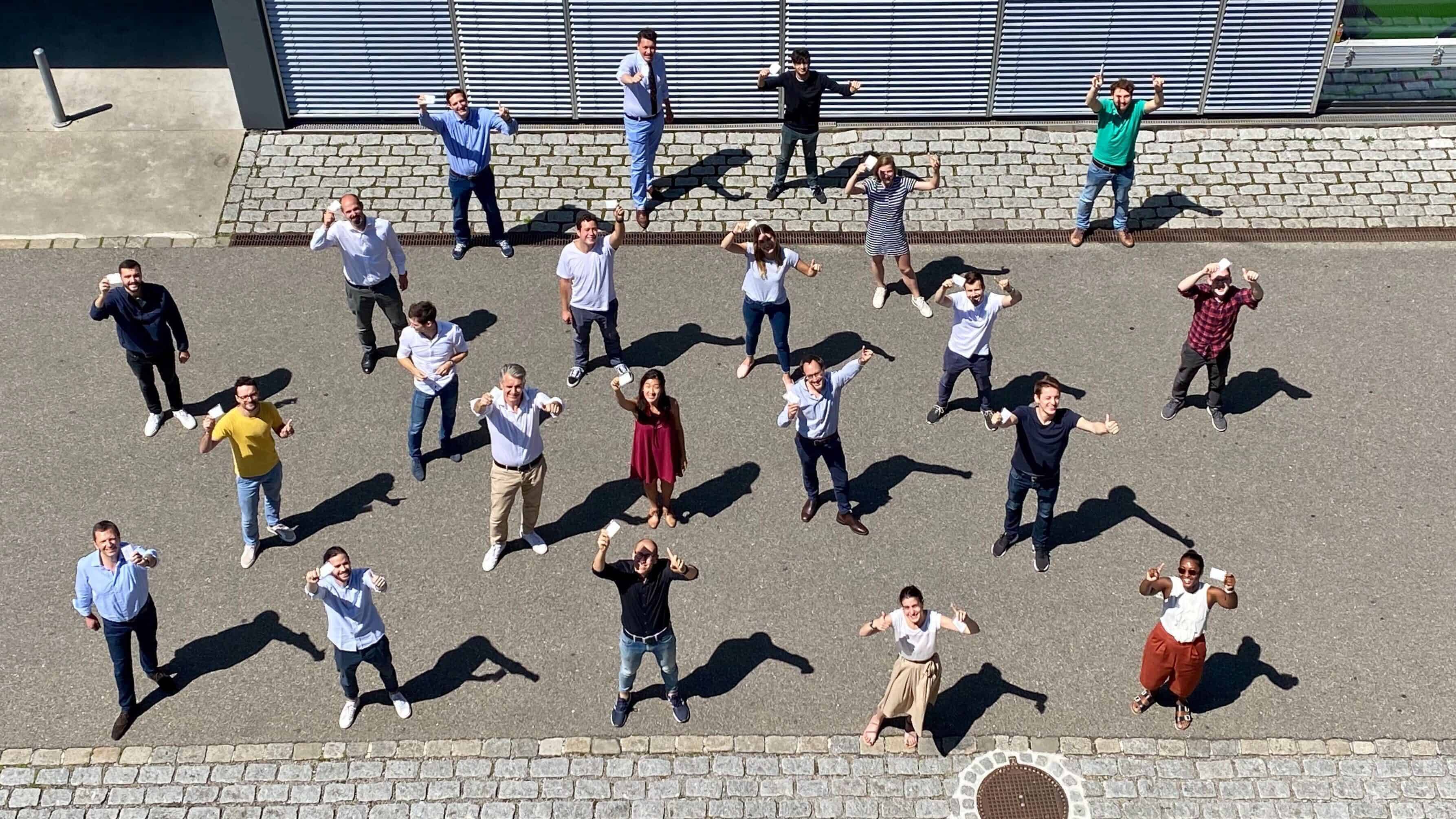What software can be patented? What is Spotify up to with its newest patents? What should startups and investors know about intellectual property? In this interview, patent attorney Fabian Fegers, who also counsels one of Germany’s most active investors, has the answers.

Partner and patent attorney at Eisenführ Speiser
Fabian Fegers is a partner and patent attorney at Eisenführ Speiser in Munich. The law firm has over 250 employees in 4 German cities. Fabian studied Mechanical Engineering and Business Administration in Aachen and Law in Hagen. He was named “Rising Star” by Managing Intellectual Property magazine.
What kind of startups do you usually work with?
As a patent lawyer, I deal with startups that are based on technology. These are startups that have based their business model on technical innovation, say, in engineering, automation, robotics, or medtech. My colleague Manuel Söldenwagner works with startups in biotech, pharma, and chemicals, where intellectual property – the fruit of years of research – is quintessential. If you are a thriving e-commerce business that is not based on technical innovation, patents are often more problematic but not impossible.
How do university spin-offs get access to patents belonging to the uni?
Ideally, a startup buys the patents. Investors prefer if startups actually own the IP. But often this isn’t possible, so the startup enters into a licensing agreement with the university that usually stipulates a fee and maybe also a right to acquire the IP in the future. The important point here is that this contract shouldn’t entail too many reporting obligations, for example, monthly sales figures, which are just a nuisance for the startup.
When do startups come to you?
Usually, before their Seed round or Series A, not later. But also not in a very early stage, because they usually lack the money and affinity for the topic, except, perhaps, if they are a university spin-off. I started to work with VCs first, our law firm is strongly engaged with High-Tech Gründerfonds, one of the most active investors in Germany. Over time, startups started to come and see us as well.
There are several misconceptions about intellectual property.
How much do these startups usually know about IP?
Startups often forget that it is their fundamental innovation on which the value of the startup is based and this intellectual property should be protected. And patents are one way – and indeed a very effective one – to achieve this. Furthermore, there are several misconceptions about intellectual property that I usually address when I present the topic. People think you can’t protect software with patents, which is wrong. Many startups believe that if they have a patent, you also have the freedom to operate, which is also wrong. A third common error is that people think that something has to be rocket science to be patentable.
Let’s take a look at these individually. What is the last error you mentioned?
If you want to patent technology, it has to be an inventive solution. But that doesn’t mean that everything has to be new, elements of that technology can already be known. If you change and adapt known technologies for a new application, this creates new and patentable IP. People often assume that the hurdles for patents are very high, which they are not.
The second error you mentioned concerns the freedom to operate. What does that mean?
FTO means that you can become active in a specific market without infringing third parties’ patents. For many companies, and the best example is a biotech company that works on one active ingredient, FTO is absolutely essential. If that ingredient is already patented, you have no chance to build a business. A comprehensive FTO analysis in Biotech can cost upwards of EUR 100’000, but not having done one is a huge red flag for investors. With tech startups, it is different, though. It is usually possible to find ways to work around existing patents.
What about the first misconception, patents on software?
If the software has no technical effect, for example, if it is a common online shop or a computer game or accounting software, usually you cannot patent it. But as soon as the software interacts with machines, say, in order to read out sensors from a car in the case of autonomous driving, or if the software enables predictive maintenance of a machine, it can and should be patented. The same is true for software that has a technical effect on the data itself. One example is video encoding, where the effect is that fewer data has to be transmitted or the quality of playback is improved. Another example is the app Evernote which categorizes images on your mobile phone and only transfers those that belong to certain categories such as invoices, hotel bookings, and tickets – actually, our law firm worked on this patent. A third example is the growing software patent portfolio of Spotify, which covers not only music streaming, but also the search for parking spaces.
What?
If you listen to Spotify on your mobile and get into your car, the logical conclusion is that your parking space will become available very soon. On the other hand, if you listen to Spotify in your car and use the navigation system, chances are that you’ll need a parking space at your destination. The algorithms that try to match this supply and demand have been patented.
Let’s talk about the procedure of establishing patents. How does a startup go about this and how much time does it take?
First of all, the idea should not be published yet, also not by yourself, let’s say in a public pitch. Now, the goal of IP is to protect a specific market, the one you want to become active in. This is why it is important that you explain the business case to the patent lawyer, who will then write the patent so that it prohibits others from entering this market. Don’t forget that the technology is the key to a specific market. After the application, it will usually take about 6-8 months to get the research result from the patent office. From the day you file the application, you have 12 months to also apply in other countries for the same patent. Until the patent is granted, it takes around 4 years on average, also because the initial claim will be refuted by the patent office in about 90% of the cases.
That sounds like a very bad result.
It is not. In the first application, you want to write down a claim that is as broad as possible. Only with the feedback of the research results of the patent office will you start to limit your scope. It’s like grabbing land on a new continent. You don’t start with staking out a tiny plot that you’ll be sure you’ll get because you might forsake territory you could have got. You start big, then you get told: This already belongs to someone else, here are the border fences. Then you reduce your claim to fit these borders.
But as you mentioned before, this takes several years, isn’t that too slow for a startup that evolves rapidly?
On the contrary, this is beneficial for startups exactly because they evolve so fast. When a patent is granted, it can’t be changed anymore. It might be contrary to common sense, but a patent that hasn’t been granted yet is often more valuable for a startup than one that has been because it still can be adapted and maybe even used to fight competitors that have evolved in the meantime. For example, when the startup is founded you believe that you really require this one particular inertial sensor in your mobile corona-tracking device to accurately track cases. Then your patent is granted and restricted to the use of this sensor. After a year, you figure out that actually, you don’t need the sensor but that a combination of GPS and Bluetooth works just as well. Then you might want to get rid of the inertial sensor in the claim. If your patent application is still pending, there is a chance to remove the sensor from the claim. If it’s granted, this chance is gone. This degree of flexibility in not-granted applications can be very valuable for evolving startups.
You mentioned that there is a 12 months period during which one can apply for patent protection in other countries as well. So one doesn’t need to cover the world with the first patent application?
No. The technological standard is fixed on the day of your first application that can cover one country only, say Germany or Switzerland. The 12 months period allows you to push the cost for the application in other markets to the future, maybe after the next financing round. At that moment, you also have more visibility about which markets are important or if the market has changed.
What do investors look for when assessing the IP portfolio of a startup?
They want to make sure no big corporate or other competitors can copy the product by investing a few million. Some investors are very keen on patents because the chances for a good exit are also better if there is solid IP. European software startups definitely need to invest more in their patent portfolios. In order to increase their chances of a good IPO, Snap Inc. has invested more than USD 17 million in software patents acquired from IBM and Mobli.
Are trade secrets not a cheaper way of achieving the same goal?
Being first to the market doesn’t mean that you always will be. Trade secrets might sound good but know-how in a company is difficult to protect. What happens if a co-founder or key employees leave the company? And with any product not protected by patents, you risk that a resourceful competitor just takes it apart and builds a functioning equivalent. Reverse engineering isn’t easy, but if you can manage to do it, you’re generally allowed to do it according to EU laws.
Written by
WITH US, YOU CANCO-INVEST IN DEEP TECH STARTUPS

Verve's investor network
With annual investments of EUR 60-70 mio, we belong to the top 10% most active startup investors in Europe. We therefore get you into competitive financing rounds alongside other world-class venture capital funds.
We empower you to build your individual portfolio.
More News
25.08.2020
Why invest in startups?
The high expected returns are an important reason why people invest in startups, but that’s not the only reason.
22.07.2020
Supercharging our startups
It has been more than half a year since we established our Portfolio Success Team to help our portfolio companies. We are happy to share a review of what has happened so far, what were some key results and what is coming next for the second half of 2020.
01.04.2020
How we are supporting our startups
Established at the end of 2019, the portfolio success team is playing a pivotal role in supporting our startups in these trying times. Here’s how.
Startups,Innovation andVenture Capital
Sign up to receive our weekly newsletter and learn about investing in technologies that are changing the world.




